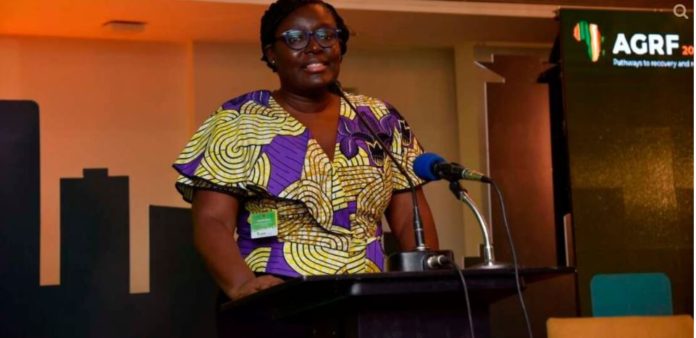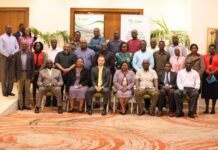The four-day AGRF 2021 Summit is set to take place next week in Nairobi, Kenya with participants expected to chart a recovery path for Africa’s food system out of the Covid pandemic and build its resilience to future shocks.
Jennifer Baarn, the Head of Partnerships at the Alliance for a Green Revolution in Africa (AGRA) and AGRF acting managing director, about the progress since the last summit in Rwanda and the financial and innovation commitments they are looking forward to in Nairobi.
“The AGRF 2021 Summit is critical for Africa’s agriculture. It is a defining moment to highlight achievements and unlock many of the political, policy, and financial commitments and innovations the continent needs to advance the pledges made at the Malabo Heads of State Summit and towards the achievement of the UN Sustainable Development Goals.
Food systems
Through the Agribusiness DealRoom, a matchmaking platform at the AGRF aimed at catalyzing new business deals, partnerships and commitments, we were able to mobilise investments amounting to US $4.7 billion in 2020.
Over the last three years, the deal room has facilitated public and private actors who jointly sought an aggregate capital of US $11 billion. Covid-19 highlighted the fragility of the continent’s food systems. Lockdowns, curfews, and illnesses revealed threats in supply throughout Africa, and the pandemic was another example of the need to urgently build more resilient food systems on the continent to withstand shocks.
Since 2014 to date, droughts have cost the region US $372 billion; while the worst locust outbreak in a generation in Ethiopia and Somalia during 2019/20 destroyed over 356,000MT of cereals and almost 1.5 million hectares of crop and pasture in Ethiopia.
Sustainable Development Goals
The AGRF 2021 Summit will provide a platform for all stakeholders to align and hold discussions on the actions and commitments needed to build resilient food systems that end hunger and support delivery of Sustainable Development Goals.
The AGRF is made up of 26 leading actors in African agriculture all focused on putting farmers at the centre of the continent’s growing economies. Through our partnerships, we work to support policy reforms at both micro and macro levels, guided by government priorities across the continent. The role of the AGRF annual summit is to highlight the progress, challenges and ways of working that can be tailored to scale in the local context for different African actors.
Covid-19 has not only exacerbated an already fragile food security context in Africa, but it has also added another complex layer to other food security threats such as climate change, crop failures, conflict, and economic slowdowns and downturns. But the pandemic is also presenting an immense opportunity that we can leverage on beyond tackling the immediate concerns surrounding health and food crises.
Role of women and youth
This is why at the AGRF Summit this year, we are calling for decisive collective action towards building resilient food systems. Going by the outcomes from the Rwanda summit, African governments have come together and shone a light on the importance of women and youth in agriculture.
This year’s summit in Kenya will have a special focus on the role of women and youth in transforming Africa’s food systems with various issues faced by these groups expected to dominate the discussions at the First Ladies Forum and the Youth Hall respectively.
Food insecurity is a major global concern. It is not unique to Africa. According to FAO, nearly 2.37 billion people did not have access to adequate food in 2020, an increase of 320 million people in just one year. No region of the world has been spared.
Multi-dimensional problem
It’s worth noting that food insecurity is a multi-dimensional problem linked to local policies, leadership, global trade policies, and the environment amongst other factors. That said, achieving food security will require a multi-dimensional approach. This approach will require us to rethink food system governance, policymaking, and implementation.
AGRA’s investments in any one country is significantly less than one percent of the total agricultural investment and it is disingenuous to attribute country yield results, both positive or negative, to AGRA’s short-term investments.
We must give credit to Africa’s leaders for recognising the critical role that agriculture can and must play in transforming the lives of millions of their people. But the numbers and results we are seeing are not optimal. The continent is not on track to achieving the UN Sustainable Development Goals by 2030.
Agricultural transformation
Another sobering fact is that the United Economic Commission for Africa recently projected US $43 billion as Africa’s annual food imports. This urgently calls for a radical transformation to wean the continent off this dependence that is projected to soar to US $110 billion by 2025.
AGRA champions inclusive agricultural transformation, which means moving farmers from subsistence farming to participation in a commercial agriculture/food system in which incomes and productive assets grow.
The transformations lead to sustained progress so that both agriculture and non-agricultural economies support faster, more inclusive, and more secure growth. At the national level, AGRA’s priority has been to support governments in the 11 selected countries to build committed, accountable and capable states.
AGRF Deal Room
Our work with over 800 partners across 11 countries has directly reached 10.1 million farmers, and indirectly over 20 million. 62% of our supported farmers have changed their practices and are adopting technologies that have increased their yields and incomes.
We have seen tremendous success in building partnerships that have leveraged US $141 million through the AGRF Deal Room, which is now the pre-eminent platform for connecting investors with opportunities.
AGRA believes that a strong private sector is crucial for the development of the agricultural sector and ending rural poverty and hunger. The private sector is fundamental to establishing sustainable systems, by providing information and products to farmers that they can use to make informed choices. AGRA believes that African farmers should have choices and access to technologies that other farmers around the world take for granted.
AGRA has focused on indigenous African businesses and has helped create 119 local seed companies and hundreds of SMEs across many value chains, including small grains such as millet and sorghum since 2007. These enterprises have produced improved seed varieties that have benefited 25.1 million farmers.










[…] Source link […]
Comments are closed.